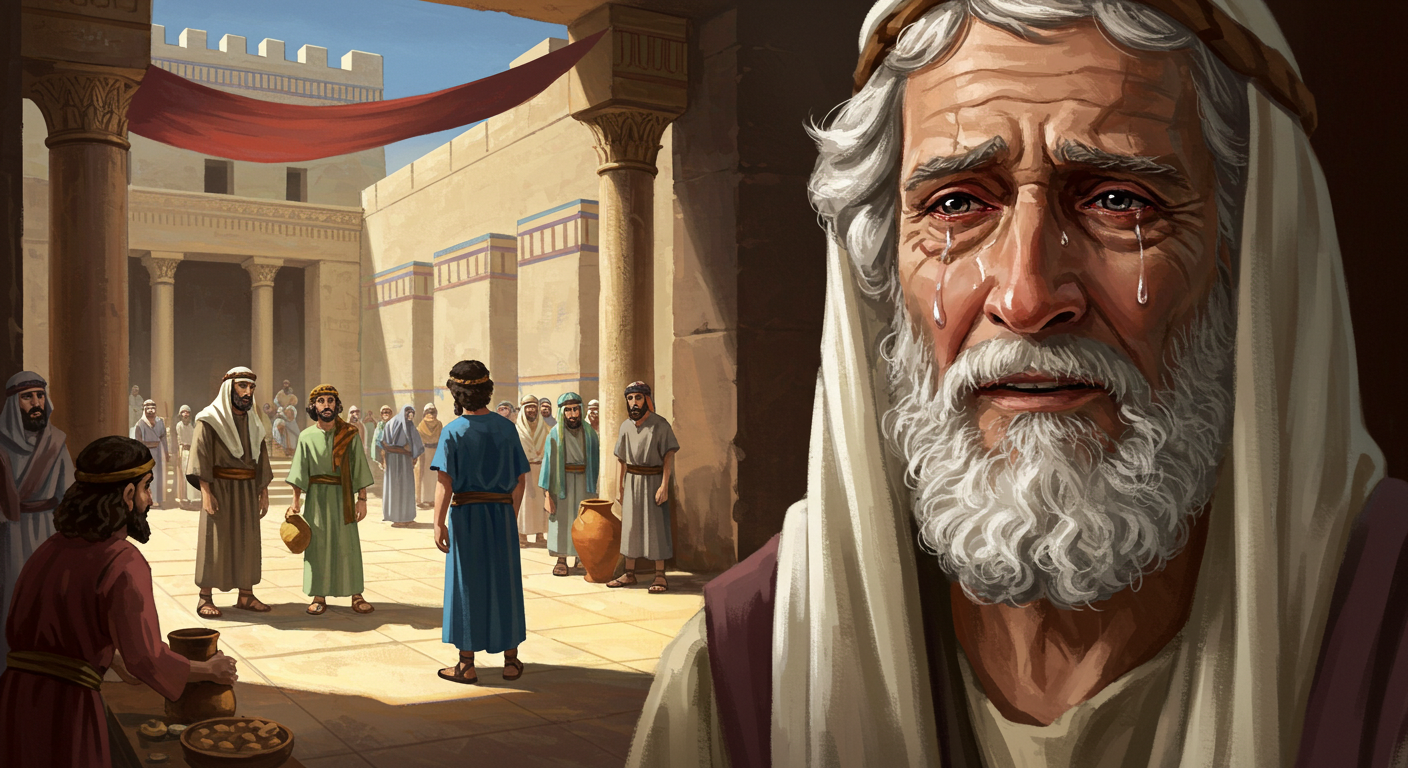What Can We Learn From Eli’s Failure To Discipline His Sons?
It’s a tale as old as time itself, wrapped in the rich tapestry of the Bible. You may have heard about the sobering story of Eli, a priest whose personal negligence rippled through his family and nation. Eli’s failure as a father is a cautionary tale that illustrates the uncomfortable yet vital lessons about the profound responsibilities of spiritual leadership and familial duties. So, what can we learn from Eli’s failure? Grab a cup of coffee, and let’s dive into this poignant narrative.
Eli’s Role and Responsibilities
Imagine a time where the roles of priest and parent were both revered and burdened with expectations. Eli wasn’t just a father; he was a high priest in Israel. His job was crucial and demanding, as he acted as a bridge between God and His people. It was a role steeped in tradition, authority, and sacred duty. As you can picture, being a spiritual leader meant not only guiding his community but also ensuring that his household exemplified those values. Eli was supposed to embody the highest form of moral integrity and set a godly example that others could look to and follow.
The Failings of His Sons: Hophni and Phinehas
Enter the next generation: Hophni and Phinehas. Eli’s sons were also priests, yet they notoriously deviated from their paths. They were described in 1 Samuel 2:12-17 as corrupt, engaging in acts that contravened their calling—practicing theft, extortion, and other grave sins in the name of their priestly office. It’s a stark contrast between the father’s position as a leader who adheres to religious laws and the sons who show a blatant disregard for them.
A Warning Unheeded
Imagine being told devastating news but choosing to sidestep it or skate around the edges rather than confront it head-on. That was Eli’s mistake. Despite knowing his sons’ actions, he offered only mild rebuke, outlined in 1 Samuel 2:22-25. He hesitated to impose stricter measures, perhaps fearing the familial rift that honest discipline can often widen. Yet, the dire consequences of Eli’s failure to reins in his children’s behavior not only affected his family but influenced the community at large.
Ignoring Sin in Spiritual Leadership
For many, it’s an uncomfortable admission to make, isn’t it? No one enjoys pointing out the speck in another’s eye. However, when you ignore sin, particularly in spiritual leadership, you’re setting a precedent. For Eli, his omission allowed corruption and debauchery to permeate his household and beyond. His passive reaction silently condoned the unacceptable, redefining the boundaries of righteousness for those under his influence. This is a poignant lesson for anyone in a position of influence: remaining aloof or disengaged in the face of wrongdoing can silently perpetuate those actions, cementing them as an ugly norm.
Consequences of Negligence
Eli’s failure as a father holds consuming repercussions, both for his lineage and his nation. The ominous warning came through a prophet, foretelling the fall of Eli’s house due to his negligence, as told in 1 Samuel 2:27-36. The failure to discipline had tangible results; they eventually lost their priestly positions, and yet more tragically, they met their end in a battle against the Philistines, as detailed in 1 Samuel 4:11.
The Ripple Effect
When you consider Eli’s failure as a father, it’s impossible not to think about the ripple effect of every choice—or lack thereof. Your inaction doesn’t exist in a vacuum. It extends beyond personal relationships and can affect an entire community. Eli’s lack of discipline led the people to question the integrity of spiritual leadership, threatening the very fabric designed to uphold their societal norms. Picture a stone tossed into a pond; the ripple extends far beyond its initial impact zone.

The Importance of Accountability
So, how can this history be rewritten in our lives? The answer rests on the shores of accountability. Eli’s story teaches us the significant value of holding ourselves and others to account. How you manage this insight can carve paths into more responsible, effective relationships. Whether you’re a parent, a docent, or someone in spiritual authority, maintaining accountability is the golden key to preventing the sequence of events that took place with Eli. It’s not just about pointing out mistakes but ensuring a culture of open dialogue where shortcomings are discussed and promptly addressed.
Rectifying Past Mistakes
Life doesn’t often permit the construction of perfect models of learning, does it? Mistakes happen. Yet, the empowering takeaway from Eli’s narrative is the fundamental concept of rectifying issues head-on rather than dancing around them. It’s crucial to learn from Eli’s failure as a father by acknowledging past mistakes and actively taking concrete steps to change course.
Building a Culture of Consequences
The absence of consequences fosters environments where wrongdoing goes unchecked, breeding havens for indiscipline and chaos. When you consider Eli’s case, it becomes glaringly evident how important a culture of consequence is to fostering an environment of honesty and integrity. Immediate and appropriate consequences for poor behavior aren’t just punitive but are constructive—they teach, guide, and refine.
Teaching by Example
Actions consistently speak louder than words. As small as this might seem, at the end of the day, the most profound lessons aren’t the ones you hear but the ones you see. Eli’s struggle underlines the importance of leading by example, which can often be the most potent sermon you ever deliver. Your actions—visible and invisible—are the lessons that reverberate through generations. They set a standard and pave a path for those who follow.
Being Proactive
Eli’s story is also a vivid illustration of what turning a blind eye can lead to. You need to take proactive steps, whether in a family or community setting, to address issues as they emerge, rather than letting them accumulate unnoticed. It takes courage to stand your ground and steadfastness to persist through uncomfortable confrontations, but these are the building blocks of healthy relationships and societies.
Understanding the Role of Boundaries
At the heart of Eli’s failure as a father was an impairment of boundaries. His permissiveness created room for disorder, underscoring how crucial defined boundaries are in any relationship or leadership role. Clear, communicated limits guide interactions and outline expectations, serving as an ethos of understanding. By having boundaries, you’re paving a clearer path for mutual respect and constructive behavioral patterns.
Embracing Open Communication
Often, ignoring issues feels easier in the short term. Eli could have benefited significantly from embracing open lines of communication, a tool just as vital in contemporary settings. Healthy dialogues invite truth to the table and encourage all parties involved to voice concerns and work towards collective solutions. You can’t fix a problem that isn’t openly acknowledged, and fostering transparent, honest conversations can often catapult a situation from troublesome to manageable.
Reflecting on Eli’s Story
The narrative of Eli’s life provides a mirror for introspection. How often do you find yourself hesitating to confront issues, fearing the surfacing of untold waves? This tale challenges you to reflect and rethink how you approach your duties, your relationship dynamics, and the responsibilities you hold. In essence, it’s a story that encourages you to learn from someone else’s missteps to choreograph a better outcome in your journey.
Turning Lessons into Actions
After reflecting, it’s equally crucial to transform lessons into actionable steps. Eli’s experience, though tragic, offers a roadmap of what not to do. By making a conscious effort to apply the lessons from his life in practical, daily actions, you avoid falling into similar pitfalls. Whether that means having tough conversations, instituting firmer boundaries, or embracing accountability, each action is a step toward a healthier, more fulfilled community and family life.
Moving Forward With Insight
The value in revisiting Eli’s failure as a father lies not in dwelling on the past but in learning enough to avoid repeating it. Today, you have the opportunity to transform understanding into wisdom. Armed with insights, you can shape an environment rich in respect, responsibility, and reverence for the roles that matter in life.
Final Thoughts
So, what can we derive from Eli’s tragic tale? More than just a story of failure, it’s an irreplaceable narrative of enlightenment, urging careful nurturance of those within your sphere of influence. The journey isn’t about the elimination of mistakes but recognizing when they’ve been made and working ardently to amend them. The tale of Eli ultimately emboldens us all to champion a life of integrity, steadfastness, and, above all, a loving but firm dedication to those we are called to guide.
Explore More
For further reading and encouragement, check out these posts:
👉 7 Bible Verses About Faith in Hard Times
👉 Job’s Faith: What We Can Learn From His Trials
👉 How To Trust God When Everything Falls Apart
👉 Why God Allows Suffering – A Biblical Perspective
👉 Faith Over Fear: How To Stand Strong In Uncertain Seasons
👉 How To Encourage Someone Struggling With Their Faith
👉 5 Prayers for Strength When You’re Feeling Weak

📘 Jesus and the Woman Caught in Adultery – Grace and Mercy Over Judgement
A powerful retelling of John 8:1-11. This book brings to life the depth of forgiveness, mercy, and God’s unwavering love.
👉 Check it now on Amazon
As a ClickBank Affiliate, I earn from qualifying purchases.
Acknowledgment: All Bible verses referenced in this article were accessed via Bible Gateway (or Bible Hub).
“Want to explore more? Check out our latest post on Why Jesus? and discover the life-changing truth of the Gospel!”








